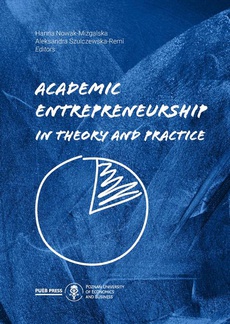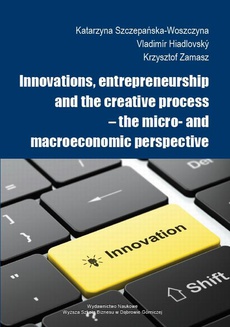INNE EBOOKI AUTORA
Entrepreneurship Education Built Upon the Concepts of Experience and Responsibility
Autor:
Wydawca:
Format:
ibuk
The heart of this monograph is to revisit existing knowledge on experiential pedagogy and then combine it with somehow forgotten concept of responsibility in order to enhance the fundaments of entrepreneurship education. This monograph aims to contribute to the dynamically developing fields of entrepreneurship and entrepreneurship education. This contribution is a refreshed, experience and responsibility-based, view into the learning process. lncluding these two concepts into theory and practice of entrepreneurship education and also investigating them from different perspectives may result in rethinking and advancing the way entrepreneurship education is executed. The monograph is an invitation to the discussion on entrepreneurship education and its foundations. lt tries to provide same answers to numerous questions, but also leaves a lot of them open, thus stimulates further reflections and research, exploring different facets and nuances of experiences and responsibility and their roles in entrepreneurship education.
| Rok wydania | 2016 |
|---|---|
| Liczba stron | 174 |
| Kategoria | Publikacje darmowe |
| Wydawca | Wydawnictwo Uniwersytetu Łódzkiego |
| ISBN-13 | 978-83-8088-043-6 |
| Numer wydania | 1 |
| Język publikacji | angielski |
| Informacja o sprzedawcy | ePWN sp. z o.o. |
POLECAMY
Ciekawe propozycje
Spis treści
| Introduction. Towards the practical but theory-driven approach in entrepreneurship education | 11 |
| Chapter I. The essence of entrepreneurship education | 27 |
| Introduction | 27 |
| 1.1. Current research status of entrepreneurship education. Theory versus practice | 28 |
| 1.1.1. Challenges and paradoxes of contemporary entrepreneurship and entrepreneurship education fields of study | 28 |
| 1.1.2. Philosophical and practical approaches to entrepreneurship education and their evolutions | 32 |
| 1.1.3. Pedagogies in entrepreneurship education | 37 |
| 1.1.4. Common problems in practice of teaching entrepreneurship | 42 |
| 1.2. Learning process as a core of entrepreneurial processes and entrepreneurship education | 45 |
| 1.2.1. The characteristics of entrepreneurial learning process | 45 |
| 1.2.2. Entrepreneurial thinking theories | 49 |
| 1.3. Entrepreneurial intentions and opportunities in entrepreneurial learning process | 51 |
| 1.4. The cognitive, conative and affective constructs in entrepreneurial learning | 55 |
| Chapter II. The foundations of experience-based learning and education | 59 |
| Introduction | 59 |
| 2.1. The philosophical foundations of experience-based learning and education | 60 |
| 2.1.1. Philosophy of education and experience – historical review from Ancient Greece up to 20th century | 60 |
| 2.1.2. 20th century: American pragmatism and Dewey’s concept of experience and experience-based education | 67 |
| 2.2. The psychological foundations of experience-based learning and education | 75 |
| 2.2.1. Behaviouristic idea of learning from consequences | 76 |
| 2.2.2. Cognitive development through experience | 78 |
| 2.2.3. Cognitive load theory | 79 |
| 2.2.4. Social psychology and experiential learning | 80 |
| 2.2.5. Social learning theory | 81 |
| 2.2.6. Self-regulated learning | 83 |
| 2.3. Pedagogy of experience | 85 |
| 2.4. The concept of experience in contemporary education theories | 89 |
| 2.4.1. Action learning | 89 |
| 2.4.2. Transformative learning and critical reflection | 92 |
| 2.4.3. Learning as a cycle and different learning styles | 95 |
| 2.4.4. Humanistic approach to learning from experience | 103 |
| 2.4.5. Modern constructivism and learning | 104 |
| 2.5. The fundaments of experiential learning and experience-based education | 106 |
| Chapter III. Towards the theory of entrepreneurial praxis | 111 |
| Introduction | 111 |
| 3.1. Different elements of the learning process in experience-based entrepreneurship education | 112 |
| 3.1.1. Action in entrepreneurship education | 113 |
| 3.1.2. Reflection in entrepreneurship education | 114 |
| 3.1.3. Experiences in entrepreneurship education | 116 |
| 3.2. Advanced learning perspectives in entrepreneurship field | 117 |
| 3.2.1. Dynamic learning perspective of entrepreneurship and critical experiences | 117 |
| 3.2.2. Experiential learning in the context of entrepreneurial opportunities | 118 |
| 3.2.3. Entrepreneurial learning as an experiential process | 119 |
| 3.2.4. Lessons from contemporary understanding of experiential learning in entrepreneurship education | 123 |
| 3.3. Towards the entrepreneurial praxis | 125 |
| 3.3.1. Characteristics of entrepreneurial praxis | 125 |
| 3.3.2. Entrepreneurship as a research field built on entrepreneurial praxis | 128 |
| Chapter IV. Responsibility and entrepreneurship education | 131 |
| Introduction | 131 |
| 4.1. Reasons behind responsibility-based learning. Education for social purpose | 132 |
| 4.2. The fundaments of entrepreneurial responsibility | 137 |
| 4.2.1. Entrepreneur as homo ethicus | 141 |
| 4.2.2. Retrospective and prospective entrepreneurial responsibility | 143 |
| 4.3. Towards the theory of entrepreneurial responsibility in entrepreneurship education | 144 |
| Conclusions | 149 |
| References | 155 |
| List of tables | 171 |
| List of figures | 173 |


























